Nov 9, 2024
Surah Al An'am (Verses 141-144)
بِسْمِ ٱللَّٰهِ ٱلرَّحْمَٰنِ ٱلرَّحِيمِ,
(bi-smi llāhi r-raḥmāni r-raḥīm)
"In the name of Allah, the Most Gracious, the Most Merciful"
"Assalamualaikum/Hello and welcome! It's a pleasure to have you join us on this platform. Feel free to explore and engage with our community."
Feel free to join the cafe and our Instagram page for notifications and updates;
Hilokal;
https://hilokal.page.link/eUxfM
Instagram;
https://instagram.com/ideologyovlife?igshid=NjIwNzIyMDk2Mg==
Chapter 6, Verses 141-144
Surah Al-An'am, Verses 141-144
Recitation.
Translation.
Tafseer.
LESSON # 17 Chapter # 6 (Surah Al An'am)
For English Reference;
https://www.islamicstudies.info/tafheem.php?sura=6&verse=141&to=144
For Urdu Reference;
https://tafheem.net/islamikitabein/urduref.php?sura=6&verse=141-144
Translations;
Please follow the sequence to find your language;
English
Urdu
Hindi
Tamil
Bangali
Korean
Kurdish
Turkish
Portuguese
Spanish
LESSON # 17 of Chapter # 6.
Difficult Vocabularies from LESSON # 17 (Chapter # 6 Verses 141-144)
Verse # 141.
1- Trellis. (Noun)
(A light frame made of bars of wood or metal crossed over each other, attached to a wall for plants to grow up.)
2- Fruition. (Noun)
(An occasion when a plan or an idea begins to happen, exist, or be successful.)
Verse # 142.
3- Pave. (Verb)
(To cover an area of ground with a hard, flat surface of pieces of stone, concrete, or bricks.)
Verse # 144.
4- Manifestly. (Adverb)
(Very obviously.)
5- Absurdity. (Noun)
(The quality of being stupid and unreasonable, or silly in a humorous way.)
6- Vogue. (Noun)
(A fashion or general liking, especially one that is temporary.)
7- Irrational. (Adjective)
(Not using reason or clear thinking.)
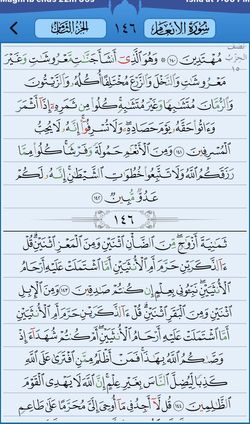
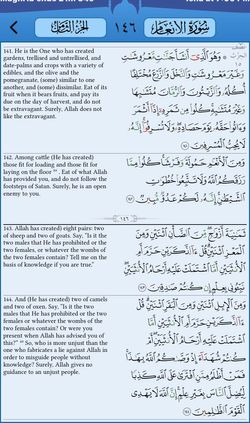
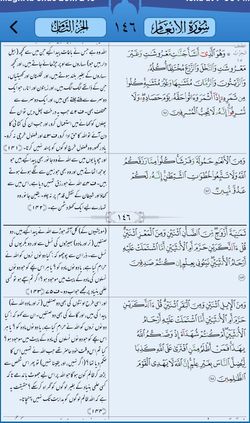
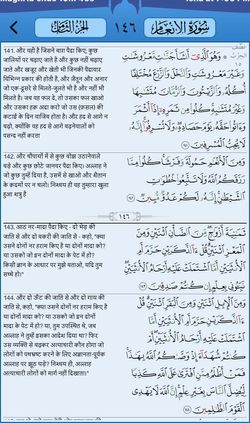
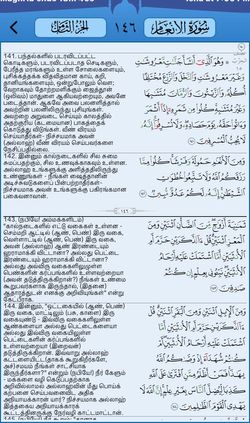
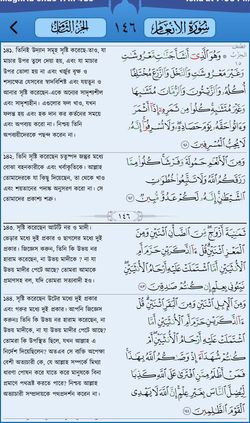
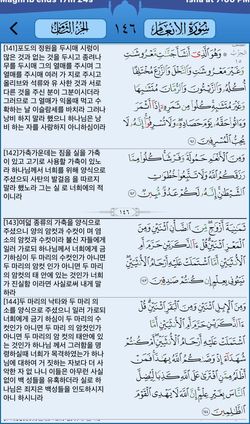
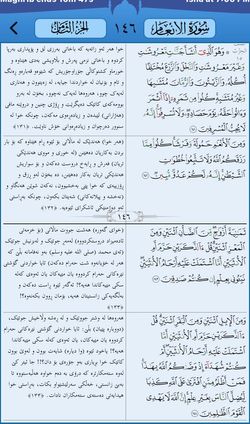
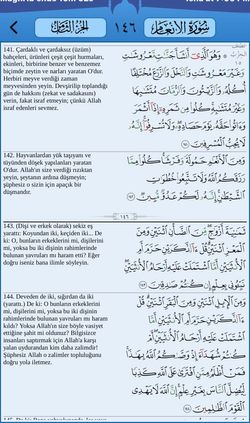
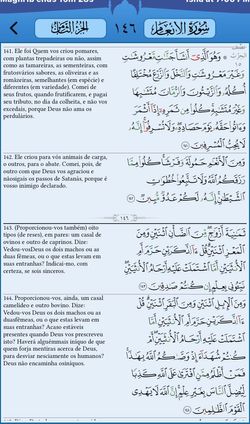
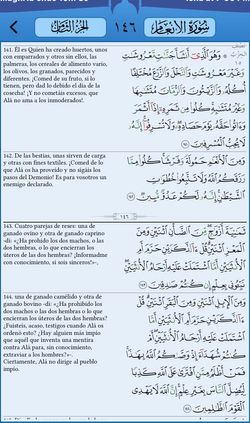
LESSON # 17 of Chapter # 6.
Summary of Verses (141-144) of Chapter # 6 Surah Al An'am:
Here is a summary of the key points in the verses of Surah Al-An'am that you provided:
1-.Bounties of Allah in Nature (Fruits and Vegetation):
- Allah is the Creator of various types of gardens, trees, and fruits, such as trellised and untied gardens, palm trees, crops, olives, and pomegranates.
- These plants, though similar in some respects, differ in taste and characteristics.
- Allah instructs humans to eat of their fruits when they ripen and to pay the due on the day of harvest.
- Allah forbids excess and warns that He does not love those who transgress His limits.
2- Cattle as Divine Bounties:
- Allah has created cattle for different purposes: some for burden, some for meat, and others for their skins and hair, which can be used for various practical purposes like covering the ground.
- The use of cattle is a provision from Allah, and people are urged to follow Allah's commands and avoid the path of Satan, who is an open enemy.
- The verse emphasizes that all these blessings belong to Allah, and only Allah has the right to regulate their use.
- People should not follow superstitions, customs, or practices introduced by others, which may prohibit or restrict the use of what Allah has provided for human sustenance.
3- Rejection of Unfounded Superstitions (Dietary Restrictions):
- The verses critique baseless and irrational prohibitions based on superstition or ancestral practices. Specifically, it addresses the false prohibitions regarding the consumption of certain types of livestock.
- Allah asks people to question the source of these prohibitions: Is it the male or female animals, or their offspring? Was this prohibition commanded by Allah, or is it merely based on unfounded beliefs?
- The verse criticizes those who fabricate lies about Allah’s commandments in order to mislead others, stating that such people are unjust and misguided.
- This is a broader criticism of irrational dietary restrictions found among various cultures, not just the Arabs, emphasizing that such beliefs are ungrounded in divine guidance.
4- Emphasis on Knowledge and Rationality:
- People are urged to rely on knowledge and reason, rather than ancestral traditions or superstitions, when discussing what is permissible or prohibited.
- The verse highlights the absurdity of prohibitions that have no basis in sound knowledge or divine law, stressing that no one should impose such restrictions without clear evidence from Allah.
Conclusion:
- Allah is the sole provider of all blessings, including food, animals, and the means for sustenance. Humans are to use these bounties responsibly, following Allah’s commands and avoiding excess or superstition.
- The verses call for rationality and adherence to Allah's guidance, condemning irrational customs and false beliefs that lead people astray.
Thankyou everyone for joining.
May Allah rewards all of you for your precious time spent here & may Allah keeps pouring his blessings upon you and your loved ones.
Stay safe & and blessed.
Aslamualaikum to all of you.
By undefined
17 notes ・ 1 views
English
Proficient